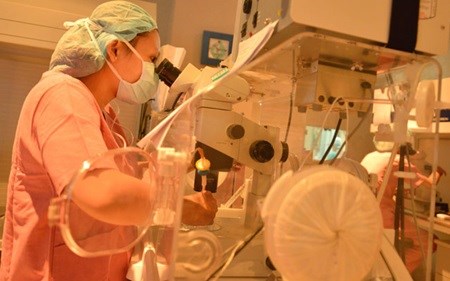Fertility ward helps Hanoi couples
About 10 percent of married couples in Vietnam are infertile.
 A doctor works at a centre to preserve sperm and eggs of infertile couples at Tu Du Hospital, HCM City. (Source: VNA)
A doctor works at a centre to preserve sperm and eggs of infertile couples at Tu Du Hospital, HCM City. (Source: VNA)About 10 percent of married couples in Vietnam are infertile.
The statistic was presented last week on the three-year anniversary of the establishment of the Reproductive Support Ward during the final workshop of "Golden week – supporting infertile couples", organised by the Andrology and Infertility Hospital of Hanoi.
"There are many different causes of infertility. It might be either the wife or the husband or both," said Le Thi Thu Hien, Deputy Director of Andrology and Infertility Hospital of Hanoi.
Hien said women are commonly diagnosed with blocked fallopian tubes, polycystic ovary syndrome, uterine malformation and endometriosis. For men, the most common issues are sperm abnormalities, azoospermia (no sperm cells are produced) and oligospermia (few sperm cells are produced).
"However, the success rate of infertility treatment for couples is quite high due to the application of a treatment regimen and appropriate medical intervention," she added.
Since its establishment, the hospital's Reproductive Support Ward has received nearly 13,000 infertility cases, of which nearly 2,400 married couples underwent in-vitro fertilisation (IVF).
Last year, the hospital's success rates of the most advanced assisted reproductive technologies – cases in which pregnancy occurred after treatment – included 31 percent of intrauterine insemination (IUI) cases, 42 percent of fresh embryo transfers and 65 percent of frozen embryo transfers.
One success story was an IVF procedure that used sperm from a deceased man. The 34-year-old wife from Hoang Mai district, Hanoi, had conceived one daughter with her husband before he died in an accident. After his death, the wife requested that his testicular tissue be removed and stored at the hospital for three years.
Doctors then applied IVF to the wife. As a result, she became pregnant and gave birth to twin boys on December 9, 2013, weighing 2.4 kg and 2.9 kg. The babies have grown healthily since.
The second case involved an IVF procedure on a 33-year-old male with hemiplegia, which rendered him physically unable to have sex for a decade.
They underwent IVF in 2012 and ended up having a healthy baby boy weighing 3.2 kg.
Subfertility, the inability to conceive for a prolonged period of time, was also discussed during the workshop.
"Married couples who can not conceive even in the absence of contraceptive methods or even after having one child should come to the hospital for check-ups for early detection in case they suffer subfertility," said Nguyen Dinh Tao, Deputy Director of the Embryonic Tissues Center under the Military Medical Academy.
Subfertility should be treated in individuals who are over 35 years old, the age at which the ability to conceive reduces sharply, especially in women, whose hormones begin to decline.-VNA













